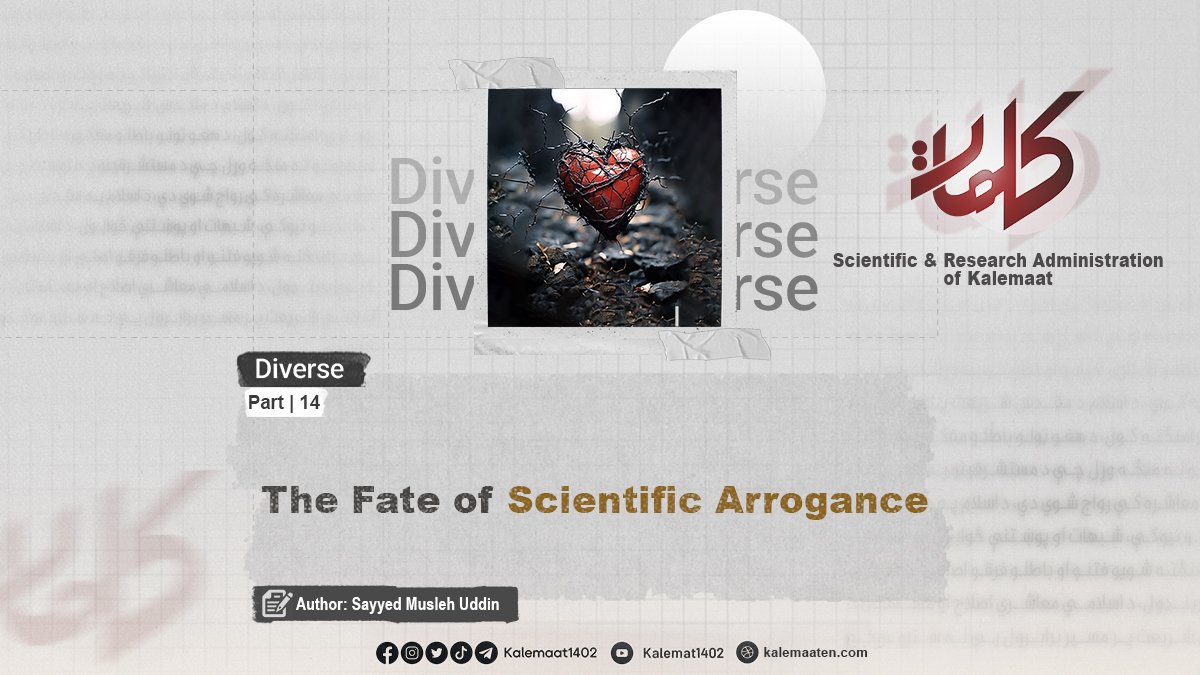
Author: Sayyed Musleh Uddin
The Fate of Scientific Arrogance (Part 14)
The Reality of Humility:
True humility means a person sees themselves as so lowly and insignificant that they are not even tempted by the idea of greatness or high status. They see themselves entirely as humble and low. A person who truly possesses this state will never claim to be humble or boast about having any other good trait—because as soon as one makes such a claim, a sense of superiority naturally follows.
In reality, humility is not about seeing others as lower or inferior while doing humble acts. Common people assume that performing outwardly humble acts is sufficient—for example, if a king serves a poor man, they will say, “This king is very humble.” Yet sometimes, such people may not possess even a trace of real humility in their hearts.
For this reason, Shaykh Zayd Majda defines a truly humble person as follows: “True humility is not when someone does a humble act while thinking, ‘My status is actually far above this, and I deserve a higher position, but I’m humbling myself by doing this.’ For example, if someone sits on the floor and sees it as beneath their dignity—believing they are worthy of a chair but chose the floor out of humility—this person is in fact arrogant, for they attribute superiority to themselves. A truly humble person is one who does something humble and does not consider themselves worthy even of that. If they sit on a carpet, they think to themselves, ‘I am so lowly I’m not even worthy of sitting on this carpet,’ or if they serve someone in need, they feel honored to do so and consider themselves unworthy of the opportunity.”
A Cure for the Scholar Who Thinks He Is Superior to the Ignorant:
Sometimes a scholar may unintentionally think, “I am learned, and that person is ignorant.” To treat this state, one should remind themselves: even though that person may appear ignorant and lacking in knowledge, I do not know who is better in the sight of Allah. It’s possible that their inner state is pure, while I, despite my knowledge, am considered low and despised before Allah. A few points of knowledge that Allah has granted you should never make you feel superior, because if He wills, He can take all of it away in an instant. If you remind yourself of this again and again, and seek Allah’s help and guidance, your arrogance will vanish.
A Golden Prescription for Treating Arrogance:
One of the most effective remedies for pride—especially intellectual arrogance—is to recall the greatness of Allah. Whenever pride or arrogance arises in your heart, particularly pride in your knowledge, immediately bring to mind the majesty of Allah and engage in an action that is seen as humbling and degrading by societal standards. Such an act can cleanse your heart of pride and bring you closer to true humility.
Treating Pride and Excessive Humility:
Many scholars, while engaged in religious work, fall into two dangerous conditions:
Pride and arrogance.
Excessive humility.
Pride arises when a person is busy with religious duties, like teaching or offering prayers, and begins to look down on those who aren’t engaged in similar religious activities or who neglect prayer.
The cure for this type of pride is to keep in mind the examples of great scholars who, due to arrogance, deviated from the path of truth and guidance—such as Bal‘am ibn Ba‘ura and others.
Excessive humility occurs when a person considers their good deeds so worthless that, for instance, after praying, they say, “My prayer had no humility, no presence, no spirituality,” as if they are indirectly complaining to Allah.
The treatment for this condition is to constantly thank and praise Allah for granting them the ability and success to perform such acts of worship.
Continues…


